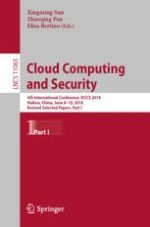2018 | OriginalPaper | Chapter
Influence Maximization Algorithm in Social Networks Based on Three Degrees of Influence Rule
Authors : Hongbin Wang, Guisheng Yin, Lianke Zhou, Xiaolong Chen, Dongjia Zhang
Published in: Cloud Computing and Security
Publisher: Springer International Publishing
Activate our intelligent search to find suitable subject content or patents.
Select sections of text to find matching patents with Artificial Intelligence. powered by
Select sections of text to find additional relevant content using AI-assisted search. powered by
